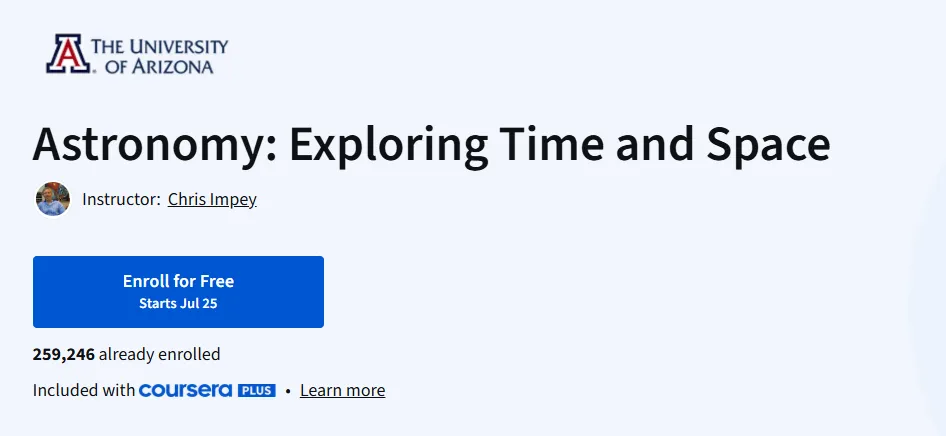What will you learn in Astronomy: Exploring Time and Space Course
Grasp fundamental astronomy concepts related to gravity and space-time.
Understand black hole formation, properties, and detection methods.
Analyze how black holes interact with their environment.
Explore real-world astronomical data and modern discoveries in astrophysics.
Program Overview
Module 1: Gravity and the Universe
⏱️ 1 week
Topics: Newton’s and Einstein’s theories of gravity, warped space-time.
Hands-on: Visualize gravity wells and simulate planetary motion.
Module 2: Life Cycles of Stars
⏱️ 1 week
Topics: Stellar birth, fusion, and death; neutron stars vs. black holes.
Hands-on: Use simulations to track a star’s lifecycle.
Module 3: Properties of Black Holes
⏱️ 1 week
Topics: Event horizon, singularity, Hawking radiation, Schwarzschild radius.
Hands-on: Calculate escape velocities and explore black hole physics.
Module 4: Observing Black Holes
⏱️ 1 week
Topics: Gravitational lensing, accretion disks, LIGO, and Event Horizon Telescope.
Hands-on: Interpret astronomical images and gravitational wave data.
Module 5: Black Holes and Modern Physics
⏱️ 1 week
Topics: Quantum mechanics, general relativity, and information paradox.
Hands-on: Analyze thought experiments and real scientific models.
Get certificate
Job Outlook
While the course is more academic than vocational, it lays a strong foundation for careers in:
Astrophysics research
Astronomy education
Data science in space applications
Skills in data interpretation, critical thinking, and scientific literacy are transferable across STEM fields.
Strong pathway to graduate studies in physics or astronomy.
Specification: Astronomy: Exploring Time and Space
|
FAQs
- High school-level math and basic physics are sufficient.
- Complex concepts like relativity are explained visually.
- Calculations are introduced gradually with context.
- The course focuses on conceptual understanding.
- Suitable for curious learners from any background.
- Covers methods like gravitational waves and accretion disk imaging.
- Introduces LIGO and Event Horizon Telescope discoveries.
- Explains data interpretation techniques used by astronomers.
- Uses real-world examples of observed black holes.
- Encourages critical thinking about detection limits.
- Lays a foundation for further astrophysics study.
- Builds skills in data interpretation and scientific reasoning.
- Useful for research assistant or teaching roles.
- Prepares learners for graduate-level physics or astronomy programs.
- Strengthens transferable STEM skills like problem-solving.
- Features visual simulations of gravity wells and planetary motion.
- Interactive exercises for star lifecycles and black hole physics.
- Encourages exploration of space-time concepts.
- Provides virtual labs rather than physical experiments.
- Helps visualize abstract astronomical phenomena.
- Explains general relativity and quantum mechanics basics.
- Discusses black hole information paradox.
- Shows how theory explains observational data.
- Integrates classical and modern physics for a complete view.
- Encourages curiosity-driven exploration of space and time.





